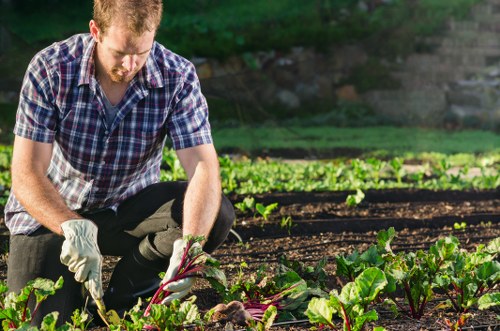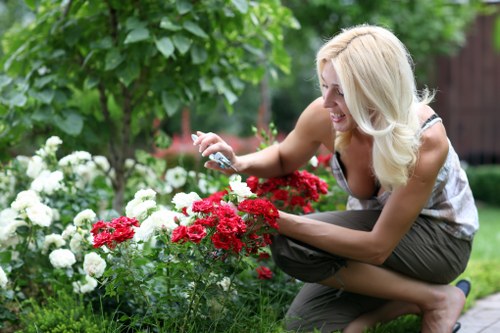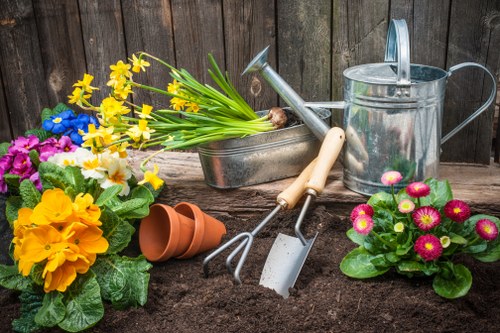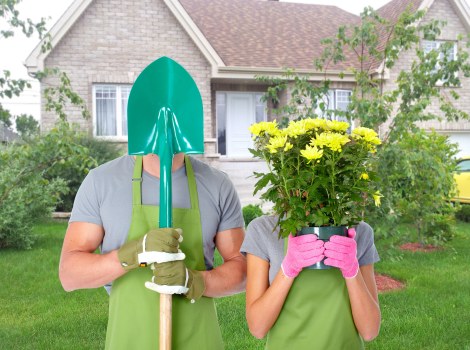Comprehensive Guide to Garden Maintenance in Queens Park
Introduction to Garden Maintenance

Maintaining a beautiful garden requires dedication, knowledge, and the right tools. In Queens Park, where the climate and soil conditions present unique challenges, effective garden maintenance is essential to ensure your outdoor space thrives year-round. Whether you're a seasoned gardener or just starting, understanding the specific needs of your garden in Queens Park can make all the difference.
Regular garden maintenance not only enhances the aesthetic appeal of your property but also contributes to the overall health of your plants. From pruning and weeding to soil management and pest control, each task plays a crucial role in creating a vibrant and sustainable garden environment.
In this guide, we'll explore the key aspects of garden maintenance in Queens Park, providing you with practical tips and expert advice to help you achieve and maintain a stunning garden.
Understanding the Climate of Queens Park

Queens Park experiences a temperate climate with distinct seasons, which significantly influences garden maintenance practices. Summers are warm and relatively dry, while winters can be cool with occasional frost. Spring and autumn are transitional periods with variable weather conditions.
Understanding these seasonal variations is crucial for planning your garden maintenance schedule. For example, summer may require more frequent watering and pest monitoring, whereas winter tasks might focus on protecting plants from cold and preparing the garden for the next growing season.
Additionally, the specific microclimate within Queens Park, such as exposure to wind or shade, can affect plant growth and maintenance needs. Tailoring your maintenance approach to these conditions will help your garden flourish.
Soil Preparation and Management

Healthy soil is the foundation of a thriving garden. In Queens Park, the soil composition can vary, but it often requires amendments to support optimal plant growth. Conducting a soil test is an essential first step to determine its pH level, nutrient content, and texture.
Based on the soil test results, you may need to add organic matter such as compost or manure to improve soil structure and fertility. Aerating the soil can also enhance drainage and root development, particularly in areas prone to waterlogging.
Regularly mulching your garden beds helps retain moisture, suppress weeds, and regulate soil temperature. Organic mulches like bark or straw are excellent choices, providing additional nutrients as they decompose.
Plant Selection and Care

Selecting the right plants for your garden is vital for successful maintenance. In Queens Park, choose plants that are well-suited to the local climate and soil conditions. Native plants are often the best choice as they are adapted to the environment and require less maintenance.
When planting, consider the sunlight requirements of each species to ensure they receive adequate light without being exposed to harsh conditions. Regular watering, especially during dry summer months, is essential to keep plants healthy and vibrant.
Pruning is another critical aspect of plant care. Proper pruning promotes healthy growth, removes dead or diseased branches, and maintains the desired shape and size of your plants. Understanding the specific pruning needs of different plant types will enhance their longevity and appearance.
Weed Control and Pest Management

Weeds compete with your garden plants for nutrients, water, and light, making effective weed control essential. Regular weeding, especially in the early stages of plant growth, can prevent weeds from becoming a larger problem. Mulching also helps reduce weed growth by blocking sunlight from reaching the soil surface.
Pest management is another critical component of garden maintenance. Common pests in Queens Park include aphids, slugs, and caterpillars. Implementing integrated pest management (IPM) strategies, such as encouraging beneficial insects, using organic pesticides, and maintaining garden hygiene, can help keep pest populations under control.
Regularly inspecting your plants for signs of pest damage allows for early intervention, minimizing the impact on your garden. Combining these proactive measures ensures a healthy and pest-resistant garden.
Watering Techniques and Irrigation Systems
Efficient watering is crucial for garden maintenance in Queens Park. Overwatering can lead to root rot and other plant diseases, while underwatering can cause stress and poor growth. Implementing proper watering techniques ensures your plants receive the right amount of moisture.
Drip irrigation systems are highly effective for delivering water directly to the plant roots, reducing water wastage and minimizing the risk of fungal diseases. These systems can be automated, saving time and ensuring consistent watering schedules.
Additionally, watering in the early morning or late evening helps reduce evaporation and allows plants to absorb moisture more effectively. Monitoring soil moisture levels can also guide your watering practices, ensuring your garden remains healthy and hydrated.
Pruning and Trimming for Healthy Growth
Regular pruning and trimming are essential for maintaining the shape and health of your plants. In Queens Park, proper pruning techniques can prevent diseases, promote airflow, and encourage new growth.
Different plants require different pruning methods. For example, flowering shrubs benefit from pruning after their blooming period, while fruit trees are typically pruned during the dormant season. Understanding the specific needs of your plants will help you apply the right pruning strategies.
Using clean and sharp tools ensures clean cuts, reducing the risk of infection and promoting faster healing of plant tissues. Incorporating pruning into your garden maintenance routine enhances the overall aesthetics and longevity of your garden.
Fertilization and Nutrient Management
Providing your garden plants with the necessary nutrients is vital for their growth and resistance to diseases. In Queens Park, the timing and type of fertilizers used can significantly impact plant health.
Organic fertilizers, such as compost and composted manure, are excellent choices for enriching the soil with essential nutrients. These fertilizers improve soil structure and provide a slow-release source of nutrients, promoting sustained plant growth.
Regularly fertilizing your garden, especially during the growing season, ensures that plants receive the necessary nutrients for optimal performance. Monitoring plant health and adjusting fertilization practices based on specific needs can lead to a more vibrant and resilient garden.
Lawn Care and Maintenance
A well-maintained lawn is a key feature of any garden. In Queens Park, lawn care involves regular mowing, aeration, and fertilization to keep the grass healthy and lush.
Mowing your lawn at the correct height prevents excessive stress on the grass, promoting deeper root growth and resilience against pests and diseases. Aerating the lawn annually improves soil compaction, allowing for better water and nutrient absorption.
Overseeding can help fill in bare patches and maintain a dense, green lawn. Choosing grass varieties that are well-suited to the local climate will reduce maintenance efforts and enhance the overall appearance of your garden.
Seasonal Garden Maintenance Tasks
Effective garden maintenance in Queens Park involves adjusting your practices to the changing seasons. Each season brings unique challenges and opportunities for your garden.
Spring: Focus on planting new flowers and vegetables, pruning dormant shrubs, and preparing the soil for the growing season.
Summer: Emphasize watering, pest control, and regular mowing to keep your garden thriving during the warmer months.
Autumn:

Prepare your garden for the colder months by removing fallen leaves, planting bulbs for spring, and protecting sensitive plants from frost. It's also a good time to fertilize the lawn and aerate the soil.
Winter: Focus on protecting your garden from frost by covering plants, pruning dead branches, and planning for the next gardening season. Ensure that your tools are properly stored and maintained for when you begin your maintenance tasks again in spring.
Adapting your garden maintenance routine to each season ensures that your garden remains healthy and vibrant throughout the year.
Choosing the Right Tools for Garden Maintenance

Having the right tools is essential for efficient garden maintenance in Queens Park. Quality tools not only make tasks easier but also contribute to better outcomes for your garden.
Essential tools include:
- Pruning shears for trimming and shaping plants
- Garden gloves to protect your hands
- Spades and shovels for digging and soil preparation
- Rakes for leveling soil and collecting debris
- Watering cans or hose systems for efficient watering
Investing in durable and ergonomic tools can reduce the risk of injury and increase the efficiency of your garden maintenance efforts. Regularly cleaning and maintaining your tools ensures their longevity and effectiveness.
Organic vs. Synthetic Garden Maintenance

When it comes to garden maintenance, deciding between organic and synthetic methods can impact both your garden's health and the environment. Organic maintenance practices focus on using natural materials and methods, while synthetic approaches rely on chemical products.
Organic garden maintenance includes using compost, natural fertilizers, and biological pest control methods. These practices promote soil health, reduce environmental impact, and create a safer environment for beneficial insects and wildlife.
Synthetic methods, such as chemical fertilizers and pesticides, can provide quick results but may have adverse effects on soil quality and non-target organisms. Balancing organic and synthetic approaches, or opting for predominantly organic practices, can lead to a healthier and more sustainable garden.
Implementing Sustainable Garden Practices

Sustainability in garden maintenance involves adopting practices that preserve natural resources and promote ecological balance. In Queens Park, incorporating sustainable methods can enhance the longevity and resilience of your garden.
Key sustainable practices include:
- Using rainwater harvesting systems to reduce reliance on municipal water
- Composting garden waste to enrich the soil and reduce landfill contribution
- Planting native species that require less water and maintenance
- Implementing crop rotation and companion planting to naturally manage pests and improve soil health
- Reducing chemical use by opting for organic fertilizers and pest control methods
Adopting these practices not only benefits your garden but also contributes to the broader environmental health of Queens Park.
Hiring Professional Garden Maintenance Services
While DIY garden maintenance can be rewarding, hiring professional services in Queens Park can ensure high-quality care for your garden. Professional gardeners bring expertise, experience, and access to specialized tools that can enhance the health and appearance of your garden.
Professional maintenance services typically offer a range of options, including regular upkeep, seasonal tasks, landscaping design, and plant care. They can provide personalized solutions tailored to your garden's specific needs, saving you time and effort.
Investing in professional garden maintenance ensures that your outdoor space remains beautiful and well-maintained throughout the year. Contact us today to learn more about our services or to book your service now.
Common Garden Maintenance Mistakes to Avoid
Avoiding common maintenance mistakes can save you time, effort, and plant health. Here are some pitfalls to watch out for in Queens Park:
- Overwatering: Excessive watering can lead to root rot and fungal diseases. Always check soil moisture before watering.
- Underfeeding Plants: Neglecting to provide adequate nutrients can stunt plant growth and reduce resilience against pests.
- Poor Pruning: Incorrect pruning techniques can damage plants and inhibit healthy growth.
- Ignoring Weeds: Letting weeds proliferate competes with your plants for essential resources.
- Using Wrong Plant Varieties: Planting species not suited to Queens Park's climate and soil can lead to poor performance.
By being aware of these mistakes and taking proactive measures, you can maintain a healthy and thriving garden.
Enhancing Garden Aesthetics
Aesthetics play a significant role in garden maintenance. Creating visually appealing landscapes involves careful planning, plant selection, and design principles.
Incorporate a variety of plant colors, textures, and heights to add depth and interest to your garden. Using focal points, such as shrubs, trees, or garden ornaments, can draw attention and add character to your outdoor space.
Additionally, maintaining pathways, borders, and garden structures enhances the overall look and functionality of your garden. Regularly assessing and adjusting your garden design ensures it remains attractive and aligned with your personal preferences.
Maintaining Garden Structures
Garden structures like trellises, pergolas, and fences require regular maintenance to ensure their longevity and appearance. In Queens Park, exposure to varying weather conditions can cause wear and tear, making upkeep essential.
Inspect structures for signs of damage, such as broken or loose components, and perform necessary repairs promptly. Cleaning structures and treating them with protective coatings can prevent deterioration and extend their lifespan.
Properly maintaining garden structures not only preserves their functionality but also contributes to the overall aesthetics of your garden.
Seasonal Planting Tips

Strategic seasonal planting ensures your garden remains vibrant throughout the year. In Queens Park, aligning planting schedules with the climate can optimize plant growth and blooming cycles.
Spring: Plant bulbs, annuals, and perennials that thrive in cooler temperatures. It's also an ideal time for vegetable gardening and transplanting young plants.
Summer: Focus on heat-tolerant plants and ensure consistent watering. Incorporate drought-resistant species to reduce maintenance during hot months.
Autumn: Plant hardy perennials and prepare beds for winter by adding mulch and protecting sensitive plants. It's also a good time to divide and transplant plants for better growth.
Winter: While active planting may be limited, winter is a crucial time for planning and maintenance. Protecting plants from frost and pruning dead growth prepares your garden for a successful next season.
Integrating Hardscaping Elements
Hardscaping elements such as patios, paths, and water features add functionality and visual interest to your garden. Proper maintenance of these structures ensures they remain attractive and safe.
Regular cleaning, sealing, and repairing of hardscape materials like stone, concrete, and wood prevent deterioration and maintain their appearance. Ensuring proper drainage and addressing any structural issues promptly can extend the life of your hardscaping features.
Integrating and maintaining hardscaping elements complements the natural aspects of your garden, creating a balanced and harmonious outdoor space.
Lighting and Electrical Maintenance
Outdoor lighting enhances the beauty and functionality of your garden, allowing you to enjoy it even after sunset. Proper maintenance of lighting systems ensures safety and longevity.
Regularly inspect light fixtures for damage or wear and replace bulbs as needed. Cleaning fixtures removes dirt and debris, ensuring optimal light output.
Consider energy-efficient options like LED lighting, which reduces electricity consumption and has a longer lifespan. Properly maintaining your garden lighting contributes to a welcoming and secure outdoor environment.
Eco-Friendly Garden Maintenance Practices
Adopting eco-friendly maintenance practices benefits both your garden and the environment. Sustainable gardening in Queens Park promotes biodiversity, conserves resources, and reduces pollution.
Implementing practices such as composting, using natural fertilizers, and conserving water supports a healthy ecosystem. Encouraging native wildlife and beneficial insects contributes to natural pest control and plant pollination.
Minimizing chemical usage and opting for organic alternatives preserves soil health and protects local waterways from contamination. Embracing eco-friendly maintenance fosters a sustainable and resilient garden.
Monitoring and Assessing Garden Health
Regular monitoring of your garden's health allows you to identify and address issues promptly. In Queens Park, staying vigilant helps maintain plant vigor and prevents minor problems from escalating.
Inspect plants for signs of disease, nutrient deficiencies, or pest infestations. Early detection enables timely intervention, reducing the impact on your garden.
Keeping records of your garden's progress, such as planting dates, fertilization schedules, and pest occurrences, aids in planning and improving maintenance strategies. Consistent assessment ensures your garden remains healthy and thriving.
Conclusion: Achieving a Thriving Garden in Queens Park
Effective garden maintenance in Queens Park involves a combination of knowledge, planning, and consistent effort. By understanding the local climate, preparing the soil, selecting appropriate plants, and implementing sustainable practices, you can create and maintain a beautiful and healthy garden.
Whether you choose to manage your garden independently or hire professional services, prioritizing regular maintenance tasks ensures your garden remains vibrant and resilient throughout the seasons.
Start enhancing your garden today by implementing these maintenance strategies. Contact us today to learn more or to book your service now and take the first step towards a stunning garden in Queens Park.

